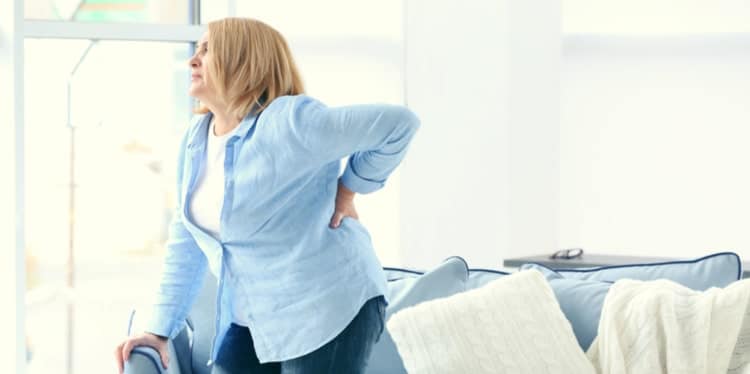
Oftentimes you’ll read articles that discuss neck pain, shoulder pain, and most frequently, lower back pain. However, the middle back – also known as the thoracic spine – is often left out of the mix. Is this because middle back pain is less common? Does the thoracic spine suffer less?
Let’s find out.
The thoracic spine begins at the base of the neck and extends to the bottom of the rib cage. It’s composed of 12 small bones, known as the T1 to the T12 vertebrae, as well as 12 intervertebral discs which nestle between each vertebra. We typically refer to this area as the middle back, but it can be referred to as the upper spine when discussing the vertebrae located closer to the neck.
The thoracic spine is strong and stable, and uses its strength to support the weight of the upper body. It also acts as an anchor to the rib cage, which provides protection for the heart and lungs to function and expand properly. An additional role of the thoracic spine is one that’s shared with the rest of the spinal column, which is to protect the spinal cord as well as the network of nerves that stem from it.
As with most back pain, the exact symptoms experienced will depend on the underlying issue. However, typical symptoms experienced with middle back pain include:
Middle back pain symptoms can be a constant, nagging pain, or can be short and sporadic bursts. Depending on the underlying condition, middle back pain can also affect the surrounding muscles and tendons supporting the thoracic spine. Often thoracic pain can be aggravated by twisting, side bending, or poor posture.
Most middle back pain is not serious in nature. However, when back pain is accompanied by weakness in the legs or loss of bowel or bladder control, you should get your symptoms checked by a doctor. Together, these symptoms can be indicative of spinal cord compression, and should be investigated.
Overall, the thoracic spine is much less mobile compared to the cervical spine and the lumbar spine. The cervical spine, or the lower back, is where we bend, twist, and lift from, and it carries most of the body’s pressure. The cervical spine supports the head, and is responsible for controlling its motion.
In comparison, the thoracic spine is simply not as mobile. While it does anchor the rib cage and supports the upper body, the rib cage is a stationary structure in the body that does not take on excess pressure to complete activities. We typically do not bend from the thoracic spine, nor do we utilize it for many activities as we do the lumbar or cervical spine. For this reason, the thoracic spine is often spared from many of life’s activities that would typically irritate other areas of the spine.
Middle back pain can frequently be attributed to muscle irritation, damage to intervertebral discs, facet joints, or soft tissue. Oftentimes, the pain felt in the middle of the back is pain referred from the lower cervical spine. Middle back pain can be caused by a variety of factors, including:
Most commonly, middle back pain is the result of the thoracic spine receiving some sort of blow, either through a fall or through an impact, like a sports injury. However, back pain is also common due to the natural aging process of the body, when bones thin and the amount of fluid between spinal joints decreases.
While surveys to discover how many people suffer something like neck pain or shoulder pain, are typically very straightforward, surveys for those suffering middle back pain often produce very varied results. For example, recent surveys have reported 4 to 72 out of 100 people have experienced thoracic spine in their lifetime.
However, it is important to note the age of those being surveyed. Middle back pain appears to be most common among children and teenagers, and is more common among girls. Middle back pain can stem from a variety of factors, but most frequently is caused by:
Additionally, mental health is an associated factor of middle back pain, with those experiencing stress or anxiety having a heightened likelihood of developing middle back pain. While adults can also experience middle back pain, they often have accompanying aches and pains elsewhere, as well as difficulties going about their daily tasks.
If you’ve been suffering middle back pain, discovering its source is the key to eliminating. At ChiroCare of Florida, our dedicated physicians will help to determine where your pain is coming from and administer gentle, effective therapies to safely alleviate it. Contact us today to schedule your appointment.
